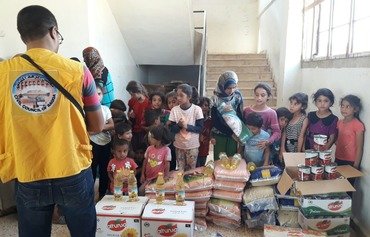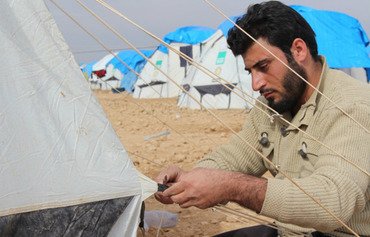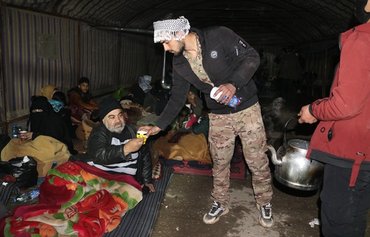As the coalition-backed Syrian Democratic Forces (SDF) prepare to storm the "Islamic State of Iraq and Syria" (ISIS) group's final pocket in eastern Syria, international coalition forces have been making earnest efforts to provide medical care and aid to residents fleeing the area.
Brig. Gen. Frederic Parisot, who heads civil-military operations for the international coalition fighting ISIS in Syria and Iraq, said July 24th that ISIS now holds an area of about 30 by 10 kilometres in eastern Syria.
This terrain is located in eastern Deir Ezzor province, and includes the town of Hajin, about 50 kilometres from Iraq's border.
Fixed, mobile medical centres
The town of Hajin has seen a steady stream of displacement towards areas under SDF control, where SDF teams are providing medical and other relief aid to the displaced.
![An internally displaced man holds a poster warning of the danger of mines, distributed by the Syrian Democratic Forces during awareness campaigns in the Deir Ezzor region of eastern Syria. [Photo courtesy of the SDF]](/cnmi_di/images/2018/08/10/13887-Syria-Hajin-IDP-600_384.jpg)
An internally displaced man holds a poster warning of the danger of mines, distributed by the Syrian Democratic Forces during awareness campaigns in the Deir Ezzor region of eastern Syria. [Photo courtesy of the SDF]
Internally displaced people (IDPs) receive medical and ambulatory services, food and relief aid at fixed and mobile centres, SDF spokesman Mustafa Bali told Diyaruna.
"The medical centres are located in areas where there are temporary or permanent gatherings of Hajin IDPs, such as the camp that was set up near the town of al-Bahra and houses more than 1,000 IDPs," he said.
Medical services include full examinations and providing medicine to patients, especially those with chronic diseases, he said.
These services are provided by the SDF and the Deir Ezzor civil council with the support of the international coalition, said Bali.
The teams also are conducting health awareness campaigns that emphasise good hygiene and cleanliness to prevent the spread of diseases and epidemics, he added.
Other campaigns raise awareness about the danger of mines and the steps that need to be taken upon encountering them, he said.
Some of the medical teams are permanently stationed inside the IDP camps, while others are mobile and provide their services to smaller gatherings of families staying in informal camps, Bali said.
Coalition secures access for aid organisations
Despite the difficulty of humanitarian and relief organisations entering the Deir Ezzor region, the international coalition has secured access to groups that work with the UN Children's Fund (UNICEF), said Azad Dudeki, a Kurdish Red Crescent official in Afrin.
These groups "provide health care for children through vaccination campaigns against polio", he told Diyaruna.
These campaigns are carried out in co-ordination with the SDF, which ensure the safety of mobile medical teams moving between IDP and informal camps, he said.
"The international coalition also provided seven ambulances exclusively for the Deir Ezzor region," Dudeki said.
The Deir Ezzor civil council assigned five of the ambulances to the health committee and the other two to the services committee, he said, adding that the ambulances serve both residents and IDPs.
Aid for all
Those who flee the combat zones in the Hajin area -- particularly the towns of Hajin, al-Shaafa, al-Sousa and al-Baghuz Tahtani -- do so either on their own or through corridors secured by the SDF in the desert.
"Relief and medical follow up is somewhat difficult considering the large number of workers needed," al-Hasakeh media activist Ammar Saleh told Diyaruna.
IDPs who pass through the humanitarian corridors receive immediate medical care, he said, adding that they undergo a medical examination, while urgent care is given to those who require it.
"Additionally, medicine is provided to those with chronic diseases, particular blood pressure, diabetes and heart disease," he said.
As for those who escape without prior co-ordination with the SDF, mobile medical and relief teams visit them at their informal camps to follow up on them, Saleh said.
The Deir Ezzor civil council, with support from the SDF, is also working to get water distribution networks up and running, he said.
This has cleared the way for the resumption of farming in the areas liberated from ISIS, where mine clearing operations have concluded, he said.
The council has brought in heavy machinery to remove the rubble and remnants of war, he said, noting that "such services are necessary, especially in densely populated areas".
Local councils are fully co-operating with the Deir Ezzor civil council to follow up on these efforts, he said, adding that the council and the SDF are the parties authorised to receive and distribute aid and provide services in the region.

![A Syrian Democratic Forces (SDF) medical team distributes medicine to IDPs from the Hajin area who are staying at a camp near the town of al-Bahra. [Photo courtesy of the SDF]](/cnmi_di/images/2018/08/10/13886-Syria-Hajin-SDF-600_384.jpg)







May God save your family!
Reply1 Comment(s)